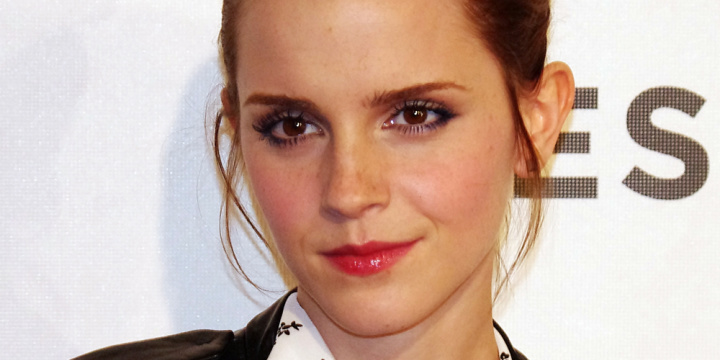Emma Watson Is Not Antisemitic, But Questions About Her Palestinian ‘Solidarity’ Remain
 by Adam Levick
by Adam Levick
The British media “debate” about British actress Emma Watson’s social media expression of “solidarity” with Palestinians isn’t really a debate of any real merit.
View this post on Instagram
In fact, if Israel’s former UN Ambassador Danny Danon hadn’t falsely accused the Harry Potter star of antisemitism, it’s unlikely that there would be a row at all over her Instagram post.
10 points from Gryffindor for being an antisemite.@EmmaWatson pic.twitter.com/Qaqkx36JSg
— Ambassador Danny Danon | דני דנון (@dannydanon) January 3, 2022
I wrote that Danon “falsely” accused Watson of antisemitism because — though there’s a proven correlation between extreme anti-Israel sentiment and antisemitism — there’s of course nothing intrinsically anti-Jewish about expressing solidarity with the Palestinians.
I’ve in fact argued in a post condemning cancel culture, that pro-Israel advocates, and activists fighting anti-Jewish racism, should be extremely careful when using the term antisemitism, and should normally only do so in accordance with the IHRA Working Definition. Even then, as IHRA makes clear, “the overall context” must be taken into account when determining whether rhetoric crosses the line into antisemitism.
However, in the media storm that ensued after Danon’s accusation, one question doesn’t seem to have been asked about the politically outspoken actress: Did she ever use her considerable social media influence to express, to her tens of millions of followers, “solidarity” with British Jews during the Labour Party antisemitism row under Jeremy Corbyn — or during the huge surge, last May, of antisemitic incidents during Israel’s war with Hamas?
Though Watson spoke out against racism and “white privilege” in the wake of George Floyd’s murder, and has advocated for gender equality, we couldn’t find any evidence of even a carefully worded condemnation of antisemitism amidst what many British Jews perceived as an existential threat to their community.
I ask whether she ever expressed solidarity with British Jews for two reasons: First, because I honestly don’t know.
Also, because it would be telling if it turns out she stayed silent amidst the outbreak of anti-Jewish incidents last Spring, and during a Labour Party racism scandal so bad that the Equality and Human Rights Commission (EHRC) found the party guilty of three breaches of the Equality Act.
If she didn’t speak out, it would serve as further vindication of the thesis of David Baddiel’s book “Jews Don’t Count,” that antisemitism is not taken as seriously by the anti-racist, identitarian left — and even mainstream literary, political, or media personalities — as bigotry towards other minorities.
Danny Danon’s accusation that Watson’s expression of solidarity with Palestinians is antisemitic was scurrilous and unserious. But the broader question of what precisely it would take to motivate British celebrities to speak up for the country’s tiny Jewish minority is one that should trouble anyone who’s intellectually honest and is sincere in their opposition to racism in all its forms.
Adam Levick serves co-editor of CAMERA UK – an affiliate of the Committee for Accuracy in Middle East Reporting and Analysis (CAMERA).
 Israel Says It Is Poised to Move on Rafah
Israel Says It Is Poised to Move on Rafah Israeli Hostage Hersh Goldberg-Polin Seen Alive in a New Hamas Video
Israeli Hostage Hersh Goldberg-Polin Seen Alive in a New Hamas Video Palestinian Prime Minister Announces New Reform Package
Palestinian Prime Minister Announces New Reform Package France: Man Suspected of Abducting, Raping Jewish Woman ‘to Avenge Palestine’
France: Man Suspected of Abducting, Raping Jewish Woman ‘to Avenge Palestine’ Israel Intensifies Strikes Across Gaza, Orders New Evacuations in North
Israel Intensifies Strikes Across Gaza, Orders New Evacuations in North Iran Threatens to Annihilate Israel Should It Launch a Major Attack
Iran Threatens to Annihilate Israel Should It Launch a Major Attack ‘Completely Baseless’: Reports of Mass Graves at Gaza Hospitals are False, IDF Says
‘Completely Baseless’: Reports of Mass Graves at Gaza Hospitals are False, IDF Says Columbia University Shutters Campus as Jews Fear for Safety, Critics Call for President to Resign
Columbia University Shutters Campus as Jews Fear for Safety, Critics Call for President to Resign ‘Hamas, We Love You!’ A List of the Chants, Statements From Columbia University’s ‘Gaza Solidarity Encampment’
‘Hamas, We Love You!’ A List of the Chants, Statements From Columbia University’s ‘Gaza Solidarity Encampment’ ‘Useless Pigs’: Anti-Israel Demonstrations Rage at Yale University, Forcing Police Intervention
‘Useless Pigs’: Anti-Israel Demonstrations Rage at Yale University, Forcing Police Intervention




 France: Man Suspected of Abducting, Raping Jewish Woman ‘to Avenge Palestine’
France: Man Suspected of Abducting, Raping Jewish Woman ‘to Avenge Palestine’ Palestinian Prime Minister Announces New Reform Package
Palestinian Prime Minister Announces New Reform Package Israeli Hostage Hersh Goldberg-Polin Seen Alive in a New Hamas Video
Israeli Hostage Hersh Goldberg-Polin Seen Alive in a New Hamas Video Israel Says It Is Poised to Move on Rafah
Israel Says It Is Poised to Move on Rafah